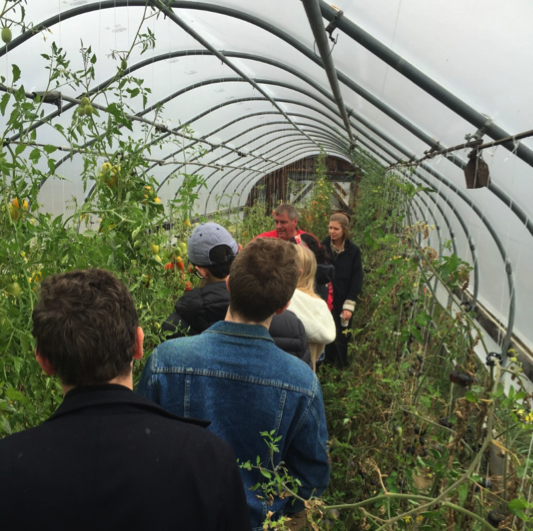
Did you know that Tufts has a Green House? Located in the D tower of Latin way is the Tufts Green House, which is a specialty housing option for people who want to live an intentionally sustainable lifestyle. The group of ten who live in the Green House work together throughout the year to reduce their environmental impact by preventing waste, composting, and learning together about more sustainable habits.
Each year the Green House also undertakes a few sustainability-themed projects. This year the house helped run the Brown and Blue Pass It Down sale at the beginning of the school year. All of the items that were sold during the sale were collected during move-out the previous spring. All of the items that were sold would have likely ended up in the landfill if they were not collected. The house has also partnered with groups on campus; last semester, they partnered with the Eco-Reps to put on a “Sewing & Saving” event to save and up-cycle clothing, the house also partnered with Students for Environmental Awareness to organized a clothing swap before the Sustainaball. Early awareness and education about sustainability is vital for building the next generation of environmentalist, that is why the Green House has been partnering with local elementary schools to promote a more sustainable early education. Finally, the Green House has been working with the Office of Sustainability to propose the new Green Fund, which will be a fund that students can use to fund sustainability-themed projects on campus.
When living in the Green House students also have the unique opportunity to meet and work with others from different backgrounds and viewpoints for the common goal of a more sustainable future. Megan Bateman, the manager of the Green House, describes her experience living in the Green House:
The best thing about living in the Green House is getting to create an intentional space with like-minded people. Setting rules and goals for ourselves creates structure and stability during a time that can be confusing and difficult to navigate. Our love for a sustainable living and desire to continually improve has made the Green House a place of positivity, growth, and mutual support. My favorite part has been watching all of us grow closer together and learn how best to support one another as each of us strives to support our planet.
Paul Henjes, another Green House resident is also the Assistant Coordinator of the Eco-Reps explained his favorite part about living in the Green House:
My favorite things about living in the Green House are the people. I always feel welcomed whenever I walk into the House and I always feel supported by the community. Also, the Green House residents all have different backgrounds and interests, and this mix allows me to gain new insights into topics I don’t know about and expand my knowledge of ones I do know about.
Interested in living in the Green House next semester? Apply now!




Find Us On Social Media!